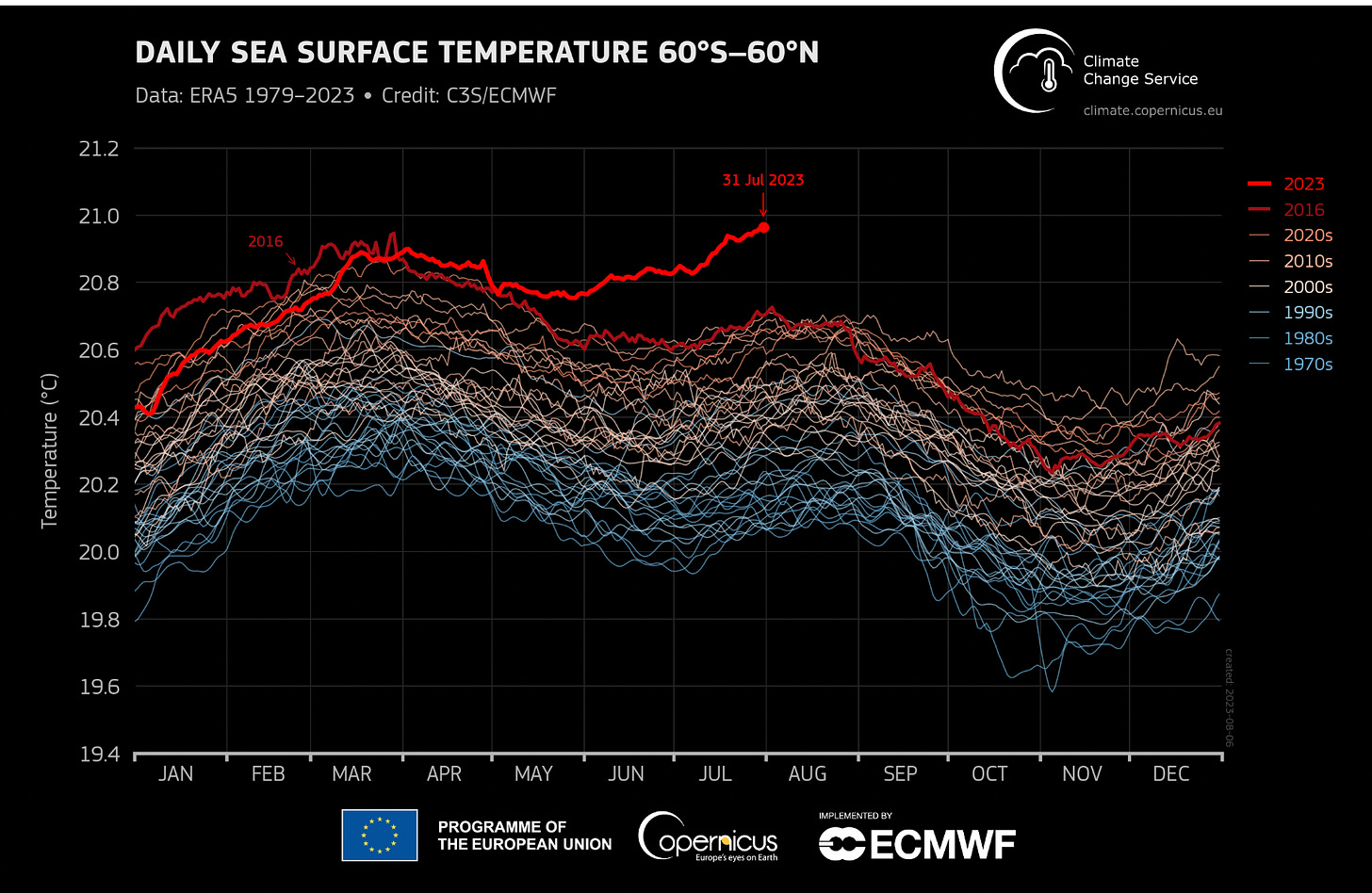The ocean has been on my mind a lot lately… what with
the people rescued from the waves fleeing the Maui wildfires, which leveled the town where Herman Melville worked as a pin-setter in a bowling alley and got the idea for Moby-Dick, the ultimate ocean story;
the 289 children who died this year alone trying to cross the Mediterranean to a better life, many fleeing disasters complicated by the climate crisis;
And these three whales that breached at the same time in a whale ballet…
and this tiny seahorse I found on a walk on Monday.
The ocean has absorbed 90% of the warming that has occurred in recent decades due to increasing greenhouse gases. The top few meters of the ocean store as much heat as Earth's entire atmosphere.
The ocean also absorbs an incredible weight of metaphor and human desire. It is the place of our dreams. Almost one in three Americans lives in a coastline county, a proportion that’s been growing in recent decades. If you ask people to point to a picture of “paradise,” they probably won’t choose the original Biblical idea of a garden. They’ll choose white sand, a palm tree, maybe a drink with an umbrella.
The ocean’s been taking on a lot. She’s been giving back a lot.
And now, it seems she’s fed up.
Can we love the ocean in a new way, more wisely, knowing that she’s in our care just as we are in hers?
Understanding that she’s vast, but not infinite?
When I was a little girl, visiting the Florida panhandle with my family, I remember being startled that the waves kept crashing all night in the darkness; that they didn’t rest with the sunset.
The myth of the infinite vastness of the ocean is one of the oldest human myths. The “oceanic feeling” is "a sensation of 'eternity', a feeling as of something limitless, unbounded," a "feeling of an indissoluble bond, of being one with the external world as a whole."
At the same time, navigating the ocean is one of the first defiant gestures toward human mastery of the planet. It’s equal parts awe-inspiring and terrifying; the Age of Exploration begat science and mathematics, free trade and the slave trade, colonialism and extraction.
Now, in this moment of human history, we’re finding the limits of the limitless. There’s no more escaping the blowback of our heedless exploitation. Eternity is forever bounded on a round planet.
Right now I’m sleeping in a room from which I can hear the waves. I’m at the same beach that I’ve visited every summer, with some of the same families, since my children were 8 months and five years old. Now they are 6 and 11. There is at least half a childhood’s worth of memories here; in other words, the blink of an eye.
We’ve seen each other through a lot over these six summers. Six summers of outdoor showers, paddling in the bay, bike rides, ice cream cones. (Twice, menaced by hurricanes). We love this place so, so much, and we’ve also decided this is the last summer we’ll meet this way, at least for awhile; it’s time to move on to new adventures.
Traditions can be fragile, but it makes them no less precious. Knowing that my children’s childhoods aren’t infinite; that they will end sooner than I can accept; doesn’t stop me from singing and dancing with them, jumping in the waves and hugging them ever more fiercely. Quite the opposite.
And knowing the ocean needs our help, and that she can’t go on accepting our excesses forever, doesn’t diminish our love or our enjoyment of her beauty and generosity. It can only make it stronger and more real.
Some links
Consider supporting the Surfrider Foundation for the protection of oceans; join or start a beach cleanup; or simply bring a bag and pick up trash the next time you walk on a beach.
To support those affected by the wildfires in Maui, try the Hawaiian Community Foundation.
What we can learn from 19th-century whaling logbooks about the state of ocean life today:
In the 1830s to 1850s, the height of whaling under sail, roughly 8,000 people, mostly young men, were out on the high seas each year searching for whales. This represented, as far as we know, the largest collective survey of the open ocean surface in the history of the human race.
I enjoyed speaking to Katherine Goldstein about public schools, and how to make the best choices for your family while supporting equity.
Don’t be afraid of your climate distress; it’s associated with positive action. “Americans who had experienced [climate related anxiety/depression] were much more likely than those who had not to say they had taken different forms of climate action. This includes having signed a petition about global warming (46% vs. 10%, respectively), or having volunteered at an organization working on global warming (19% vs. 2%).”
The Stolen Year e-book is on sale this month only for $3.99. If you buy one, drop me a note and I will send you a surprise in the mail.
Embers of Hope by Bonita Ford is available from August 15 to September 15 for E-book purchase, with all proceeds going to the Climate Mental Health Network. Use promo code: CMHN15
“During this time of climate, ecological and other crises, Embers of Hope is a needed beacon to help us navigate ecological grief, feelings of despair, hope and more. Embers of Hope is the missing piece in our climate, social and other justice work. This is the antidote we need to face our mortality while fostering hope for a better future.” Click here to learn more and purchase your copy.








